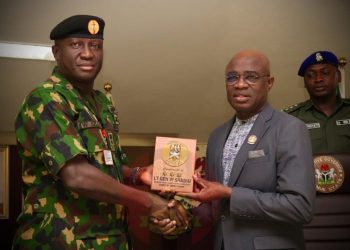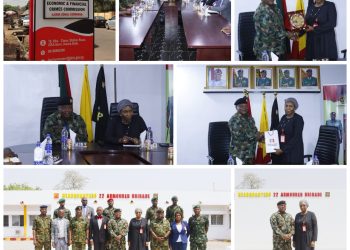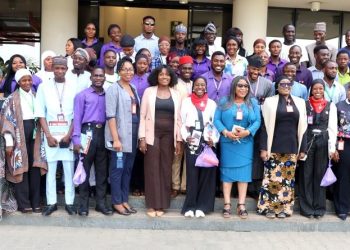By Nkechi Eze
The Office of the National Security Adviser (ONSA), led by Malam Nuhu Ribadu, through the National Counter Terrorism Centre (NCTC), has stepped up coordination among security stakeholders to address Nigeria’s evolving security challenges, including terrorism, insurgency, banditry, and the increasing threat posed by Improvised Explosive Devices (IEDs).
At a recently held stakeholders’ meeting in Abuja to review the National Counter Terrorism Strategy (NACTEST), ONSA, in collaboration with the NCTC, brought together representatives from public sector institutions, civil society, and the international community to fine-tune responses to emerging threats in line with the Federal Government’s resolve to ensure national safety.
Delivering the keynote on behalf of NSA Ribadu, the Coordinator of NCTC, Major General Adamu Laka, emphasized the urgency of adopting more dynamic and unified responses to complex threats. He noted that the rapidly changing threat landscape required an equally adaptive and collaborative counterterrorism framework.
He described the meeting as pivotal, stating, “Today’s meeting is at a pivotal juncture in our efforts to review the National Counter Terrorism Strategy. The threat landscape continues to evolve in complexity and scale. Our responses, therefore, must be equally adaptive, collaborative, and forward-looking.”
General Laka explained that the revised NACTEST was anchored on two primary frameworks: the Whole-of-Government and the Whole-of-Society approaches. The Whole-of-Government model involves stronger inter-agency coordination among relevant Ministries, Departments, and Agencies (MDAs) to scale up intelligence sharing and leverage their collective expertise.
“It is only through this kind of unity that we can effectively identify vulnerabilities, disrupt terrorist networks, and prevent attacks before they occur,” he stressed.
On the other hand, the Whole-of-Society model recognises terrorism not just as a security threat, but also a socio-ideological challenge. It calls for stronger grassroots engagement involving local communities, civil society organisations, religious and traditional leaders, and private sector players to counter radical ideologies and build trust within communities.
Laka announced the completion of the first draft of the revised NACTEST document and hailed it as a significant milestone in the country’s counterterrorism efforts. He urged all stakeholders to critically review the draft and provide constructive feedback, while taking ownership of its implementation within their respective domains.
This meeting followed an earlier one held on February 25, 2025, where stakeholders had agreed on the need for renewed strategies in light of the growing complexity of security challenges nationwide.
Reaffirming the Federal Government’s unwavering commitment to national security, General Laka assured that the NCTC remained steadfast in supporting and coordinating Nigeria’s multi-stakeholder counterterrorism operations. He praised participants for their continued collaboration and urged them to remain resolute in their shared mission to safeguard Nigeria. “Let us work together in service to this noble cause,” he said.
In a related development, the NSA also called for stronger regional collaboration in addressing the proliferation of IEDs by terrorist groups operating in West Africa. Speaking at the Regional Meeting on Countering Improvised Explosive Devices (CIEDs), held at the NCTC in Abuja, Ribadu—represented by the Permanent Secretary, Special Services Office (SSO), in the Office of the Secretary to the Government of the Federation (OSGF), Mohammed Sanusi Danjuma—warned of the increasing threat posed by IEDs in the region.
“I’m honoured to stand before you at the Regional Meeting on Countering Improvised Explosive Devices as we come together to address the pressing need of preventing and countering the acquisition and use of IEDs by terrorist groups in West Africa here at the National Counter Terrorism Centre (NCTC),” Ribadu stated.
He expressed gratitude to key partners such as the Global Counter Terrorism Forum (GCTF), the West Africa Capacity Building Working Group, the International Institute for Justice (IIJ), and the United Nations Office on Drugs and Crime (UNODC) for their dedication and cooperation in hosting the regional meeting.
The NSA noted that the event provided a platform to share knowledge, experiences, and best practices for tackling the threat of IEDs, and to develop effective mechanisms that enhance the region’s counter-IED capabilities.
“The threat of terrorism knows no borders, and it is only through collaborative efforts such as this that we can effectively confront and defeat this menace,” Ribadu added, urging participants to actively contribute to the development of actionable solutions.
Algerian Ambassador to Nigeria, Hocine Mezoued, also addressed participants, delivering his remarks in French. He praised Nigeria and the event organisers, expressing Algeria’s readiness to support Nigeria and other African nations in their shared goal of achieving regional security and peace.
Similarly, the German Ambassador to Nigeria, Annette Günther, expressed concern over the growing scale of terrorist operations in West Africa, particularly the increased use of IEDs. She noted that technological advancements were threatening the progress made by several countries, including Nigeria, in restoring stability—especially in the states of Borno, Yobe, and Adamawa.
“In recent times, we have witnessed a notable increase in high-impact attacks, particularly involving IEDs,” Günther observed. She commended the efforts of the West Africa Capacity Building Working Group and their partners, pointing out the importance of initiatives such as the Lume Recommendations.
She explained that the Lume Recommendations, developed during a previous regional meeting in 2023, had been refined through inputs from West African partners and global counter-IED experts. These recommendations have since evolved into a best-practice document tailored to the specific challenges of West Africa, including efforts to disrupt IED supply chains and embed intelligence into law enforcement practices.
As West Africa confronts an increasingly dangerous security landscape, Nigeria, through ONSA and the NCTC, is taking proactive steps to adapt its strategies, deepen regional cooperation, and mobilise a whole-of-society response against terrorism and violent extremism.

















